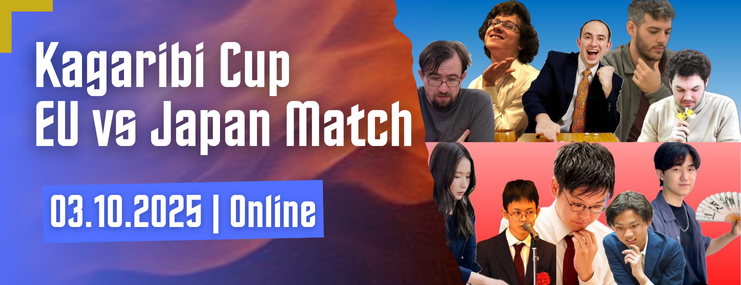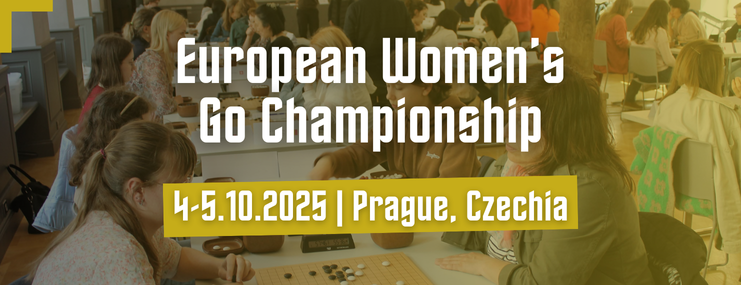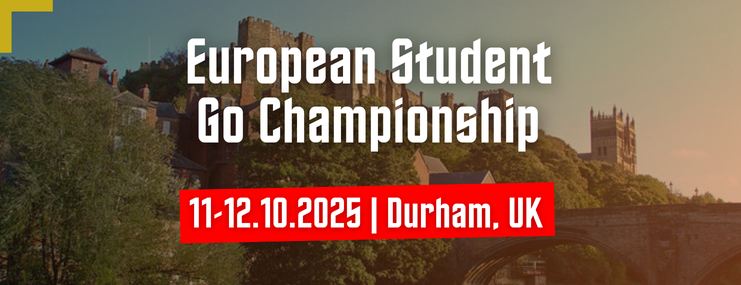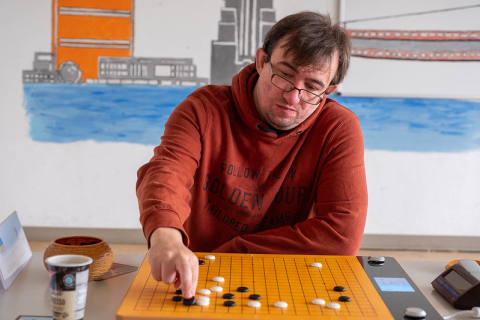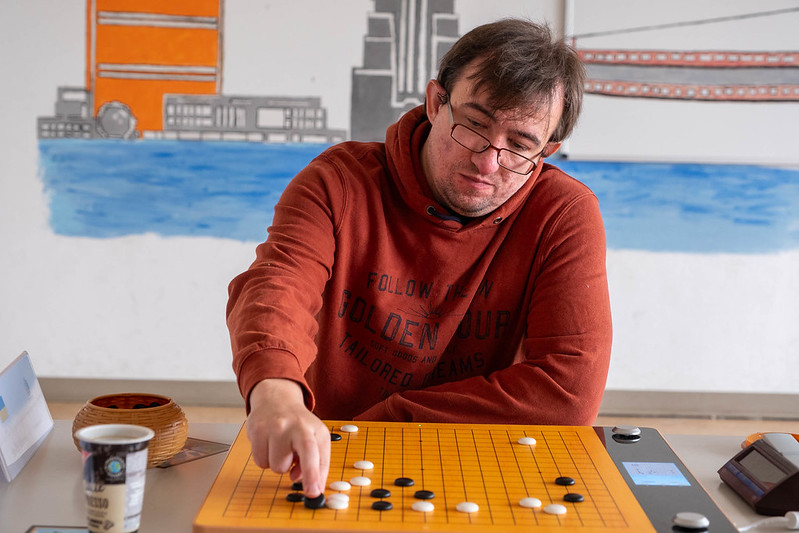
At the end of July, Andrii Kravets 1p won both the individual European Championship and the Pandanet European Team Championship as a member of the Ukrainian Team – a great occasion for an interview in our magazine!
I have known Andrii for more than 20 years and witnessed every step on his way to success. We started playing at the same go club in Rivne and grew up together as players, often travelling together to numerous tournaments as friends and rivals. An interesting coincidence: Andrii is two years older than me but we share the same birthday. Enjoy his story below!
Artem: How did you get started playing go?
Andrii: When I was a child I liked to play board games. We had a chess board at home and I suggested playing game to everyone who visited us. I also liked to play cards, but the games I knew at that time were somehow boring. At the age of eight, my parents sent me to a summer camp for one week. There were a lot of activities, but I found a board game section and discovered a lot of interesting games. Moreover, there was a chess tournament and I managed with my young age to beat a lot of older kids and achieve a good result. After that summer I found out that Viktor Shevchuk, the teacher that showed me all those interesting games, lead a club for intellectual games at the Rivne Palace of Children and Youth just across the road from my apartment. So, one day I decided to go there and play to improve my chess skills. On the first day I won a few games and the teacher said that I might like a game even more complicated than chess – go. I tried it and really liked it. From that day on I barely played chess again.
Artem: What has been your path in go so far?
Andrii: I started to play at the age of eight in Rivne, my native city in the west of Ukraine. In my free time I only played go and reached 6-kyu level in one year. After that my progress slowed down and I was improving by two or three ranks per year. When I was ten, I won my first trophy – the Blitz tournament at the LG Cup in Moscow. That gave me a lot of motivation to continue playing and studying go. Each year I participated in the youth championships and managed to win the U12 category of the European Youth Championship 2001 in Prague. At that time I was around 1-dan in strength.
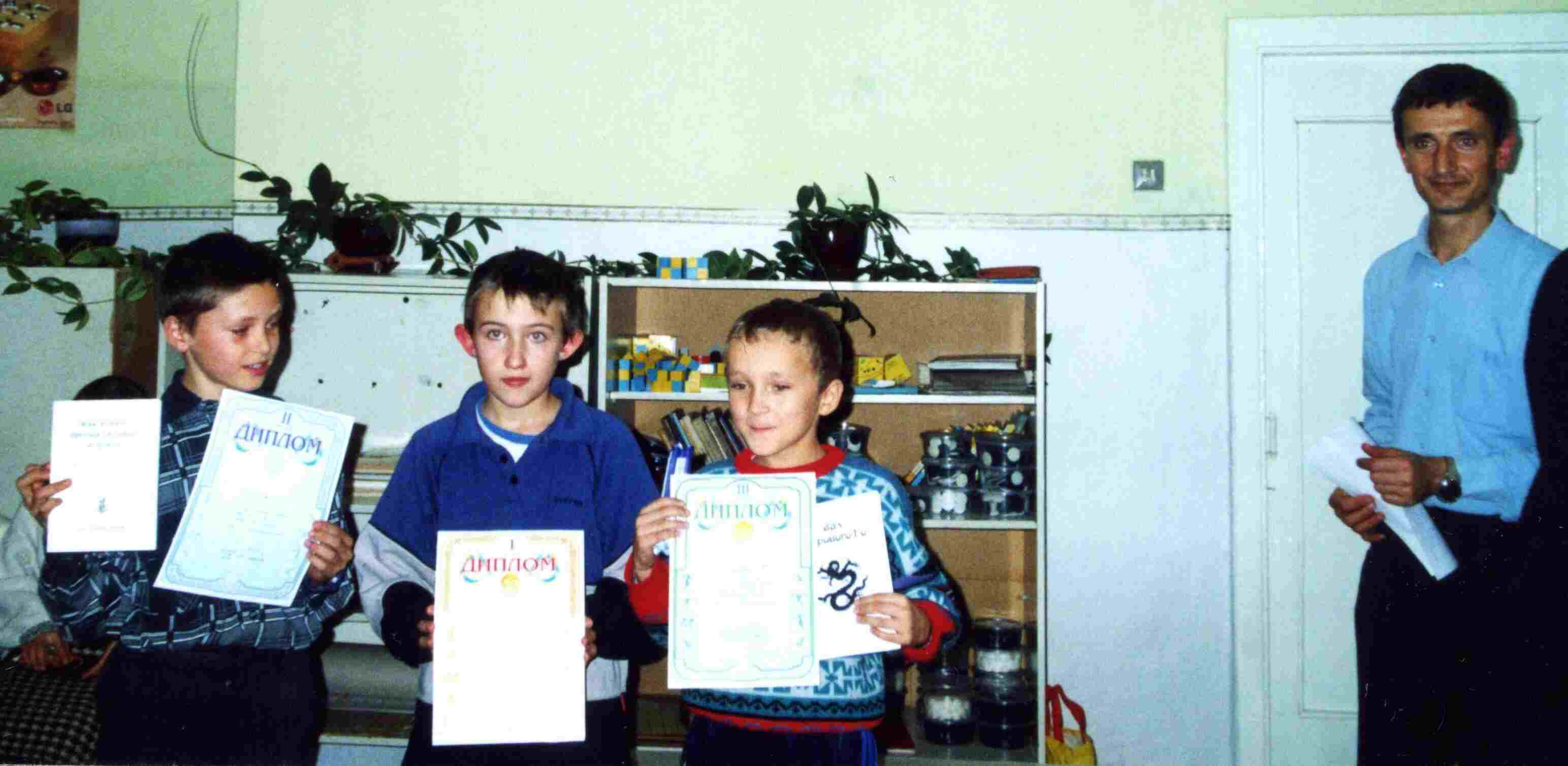
When I started learning go, the strongest player in Rivne was 2-dan, but he was not that active, so I played a lot with players of similar strength – Bohdan Zhurakovskyi, Kostiantyn Lopatiuk and you, Artem. I improved slowly but steadily.
At the age of sixteen I finished school and moved to study at the Polytechnic University in Kyiv. At that time there were a lot of 5 and 6-dan players in Kyiv, so I had the opportunity to play with stronger players. In one of the tournaments, I managed to beat three 4-dan players and was promoted from 1-dan directly to 4-dan. I reached the level of 5 and 6-dan gradually.
After I graduated, there was an opportunity to study go in China and I took part in 2013 and 2014. There I significantly improved my skills and soon reached 7-dan.
The EGF started organizing Professional Qualification tournaments from 2014, I started participating in them in 2015. In 2016 I managed to reach the final but I lost to you, Artem. In 2017 I finally won the tournament and was certified as a 1-dan professional. My rank hasn’t changed since then, but I think I have improved a lot. I’ve had a few good results, like second place in the 2019 European Professional Championship, but this year I finally got to win a big title – the European Championship. I hope this will inspire me to continue improving.
Artem: Please tell us about your experience of studying go in China.
Andrii: I studied go in Beijing twice – in 2013 and 2014. That was when CEGO, a sponsor of the EGF, started organizing a half-year scholarship for talented young Europeans – the so-called CEGO Academic Program. The first year was a test-run: they gave us a room in a hotel and hired strong professionals to teach us. Also, once per month we participated in amateur go tournaments. We also tried to attend a go school in the last month, but that was not so easy because we were living in another part of Beijing. Overall, during this trip my learning was not that efficient, but I realized that it’s good to study in a group and with a teacher.
Next year the system of training was organized way better, we studied at one of the best go schools in China, the Ge Yuhong Academy, and lived just five minutes’ walk away. Each morning we started at 8:30am with tsumego, played two games and in the afternoon we had two training sessions until 9pm with lectures, game reviews, etc. We learned from top professionals, and I think all this training helped me a lot to reach 7-dan and 1-dan pro soon after.
Artem: Can you describe your playing style? How has it changed over time?
Andrii: My playing style has been very aggressive since I started playing. I always liked to fight and all types of complicated positions. It changed in China: fighting consumes a lot of energy and it’s very hard to play a few games with this style each day. I had to learn how to play more simply. Overall, after this experience I realized that I should learn different styles and decide how to play depending on my opponent – to think before the game about their weak and strong sides and choose my strategy depending on that.
Artem: What are the achievements in tournaments that you value the most?
Andrii: I think one of the most important achievements for me was Ukraine’s team victory at the 2016 Pandanet European Team Championship in Saint-Petersburg. That year, I lost in the final of a Pro Qualification and this victory gave me confidence and made me realize that I can show great results whether I’m a professional player or not. The next one I guess would be the 2017 Professional Qualification: I set myself the goal to become professional many years before and finally I achieved it. And of course, this year’s European Championship is very important to me – now I have written my name in the history of European go.
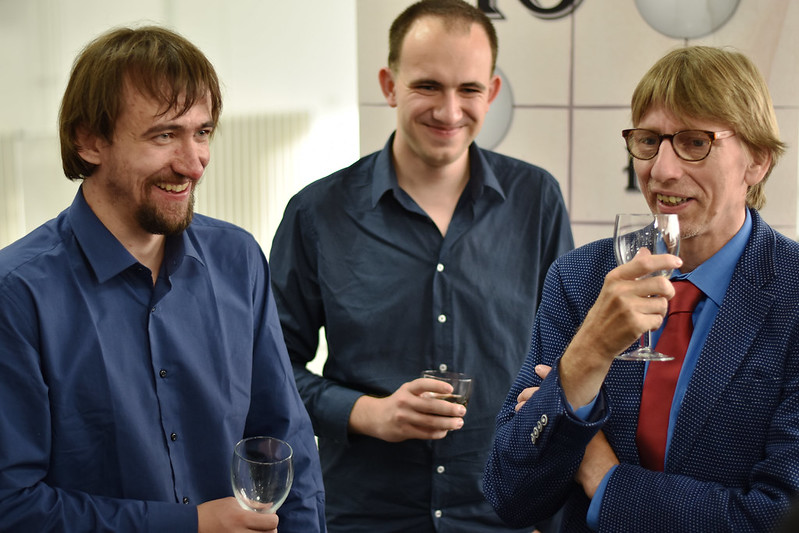
Artem: How did the European Championship this year go for you? How do you feel after winning it?
Andrii: I’m very happy that I won, that is a great achievement for me. I won the first game against Davide Bernardis 5d and was paired against Jonas Welticke 6d in the second round. This game was very important because if I won it, I would get at least one day of rest. The game was close, but in the end I took a gamble that I could live inside Jonas’ territory; he played very well and killed my group, so I lost. This put me in the loser’s bracket and losing again would mean elimination. In the next round I played my compatriot Dmytro Bogatskyi 6d, that was a relatively easy win. At that point I didn’t believe I could still win the Championship: my next opponents were Lukáš Podpěra 7d and Tanguy Le Calvé 1p and this was only to qualify for the quarter-final. Luckily, I have a good score against both of them and managed to win, although it was not so easy: for example, Lukáš was one move away from living with a big group and my journey to the title would have been over.
So, I reached the quarter-final and this was already my best result in the recent European Championships. My opponent was Stanisław Frejlak 1p, who has a positive score against me. The game was very complicated and I managed to kill his group in an early fight. Later I reviewed that game with AI and it showed a way to efficiently sacrifice the group, but it was the kind of sequence that is difficult to find for a human. Stanisław tried to complicate the game, but it only made things worse for him. In the endgame I tried to play as safely as possible and managed to keep the lead. This victory gave me a lot of confidence.
My opponent in the semi-final was Ashe Vazquez 7d; that game went well for me from the start, but in the late middlegame I made a blunder worth around 10 points and the game became close. Nevertheless, I managed to keep the lead in the endgame.
Before the final I felt confident: I had managed to win four games in a row against 7-dans and a professional player. With Ali Jabarin 2p I have an even record, but I think my confidence helped me a lot. The final game was going very well, I found a nice tesuji in the middlegame and was leading approximately by komi. In the endgame, however, I started to feel the pressure and make some mistakes, so the game became close and I won by 11/2 points.
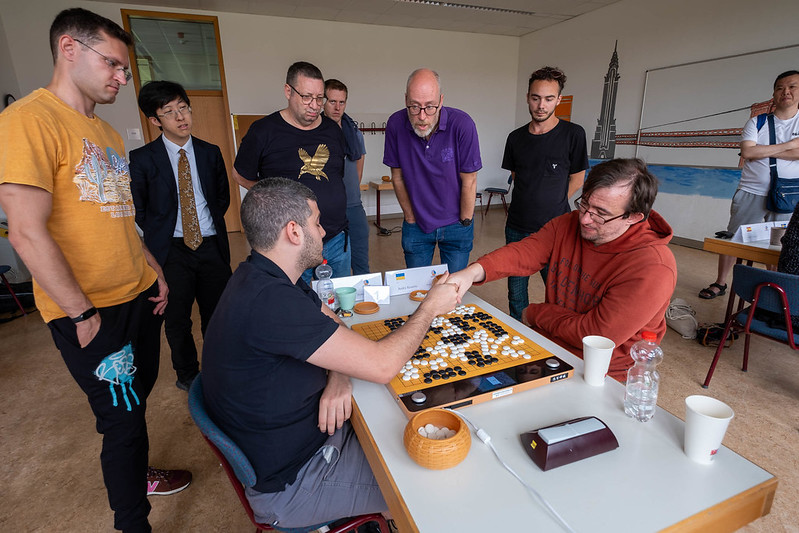
Artem: Was this result unexpected for you? Can you share the secret of your success?
Andrii: It was a surprise for me that I could play well with long time settings. Before this tournament all my results were worse than average with this time control. My expectation was that I would reach the quarter-final. I think the secret of this result was that I was mentally ready to play a long five or six-hour game and win in the endgame. I have trained endgame a lot in recent years; now I feel like I can keep the lead or even sometimes gain some points in the endgame. Also, one more factor that helped me a lot was the support of the people around me. It gave me the motivation to fight until the end in those hard games.
Artem: How do you study go nowadays?
Andrii: Nowadays I study only actively before the big tournaments. When I’m training, I usually try to win at least one game against AI with proper handicap and also win at least one game on one of the internet servers with a human. Sometimes I try to finish professional games against AI to improve my endgame. Also, I give lessons and stream on Twitch all year long – that’s also some kind of training, although not that efficient.
Artem: How do you feel about development of go in Europe? Do you think the level of top players is rising?
Andrii: I think the level of go has increased a lot in the last few years. The possibility of reviewing and playing with computers helps us to learn faster. I think maybe the level stopped rising as quickly in recent years because of the corona virus. At that time a lot of tournaments were canceled and many players decided to find new professions or hobbies. Now a lot of the top players spend much less time playing and studying go than before the pandemic. It also gives young players a chance to reach the level of the strongest amateurs and professional players. So, I think soon we will see even more new names in the final stages of tournaments.
Artem: What are your hobbies?
Andrii: My hobbies are playing computer games and watching TV series. I started to play video games when I was a child and I think I developed my fighting spirit there. Any game that I play I try to win. Watching TV series is a much more relaxed way to spend your free time, sometimes it’s very useful for me after long and stressful games and tournaments.
Artem: What is your main occupation?
Andrii: My main occupation is a go teacher. I have a lot of online students and hold regular lessons with them. I also teach online and offline at the Jena International Go School. From time to time, I go to different tournaments and organize seminars and other teaching activities. I also stream and commentate tournaments online for the European Go Federation. I’m always happy to take new students. For me it’s not that important what level a player has, but how motivated that person is to improve. If you have questions about teaching you can contact me via email: wichmaster at baduk.org
Artem: Can you tell us a few words about your family, please?
Andrii: My parents live in Rivne Oblast, so far it’s more or less a safe place. I also have an older brother, he moved to Poland due to the war. I live in Jena with my wife, Daria, and two cats, Luna and Ofelia. I appreciate their support and help on my path as a go player.
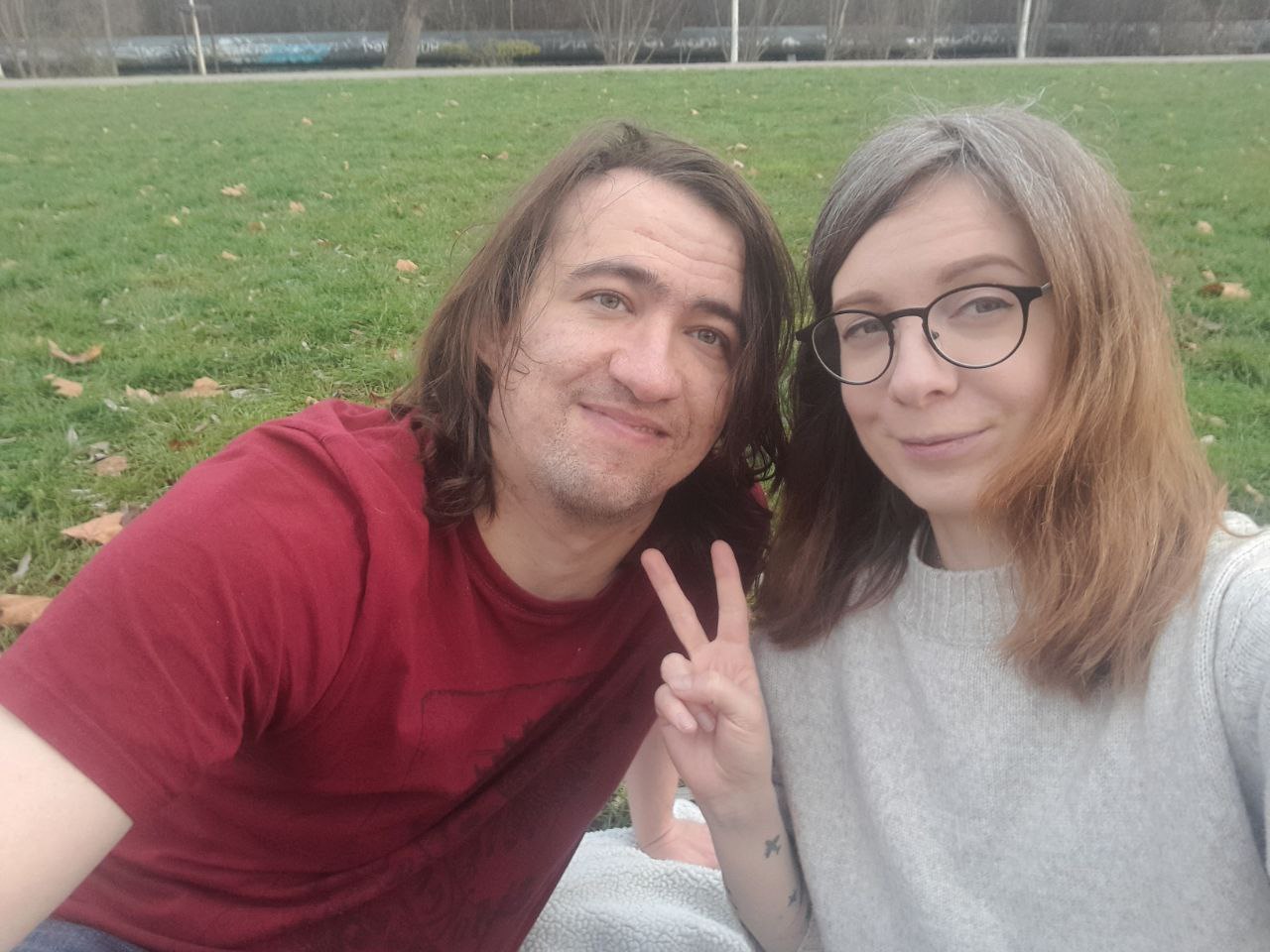
Artem: Have you ever encountered blocks or walls in your journey of learning go? If so, how did you overcome them?
Andrii: In my life I had a lot of moments when I could not grow fast enough and thought I had reached my limit, but I’m still playing and improving my skills day after day. I think, first of all, in order to overcome the wall you should have a goal. It does not matter how far away your goal is: you should create for yourself small steps that you can reach, for example playing a game every day, solving some problems, learning joseki. I, for example, play against AI with a certain value of komi and I always feel great if I can make the komi smaller over time. After some time, you will see that everything you do is a bit easier and you have become a bit stronger. These small victories will help you find the motivation for the next steps.
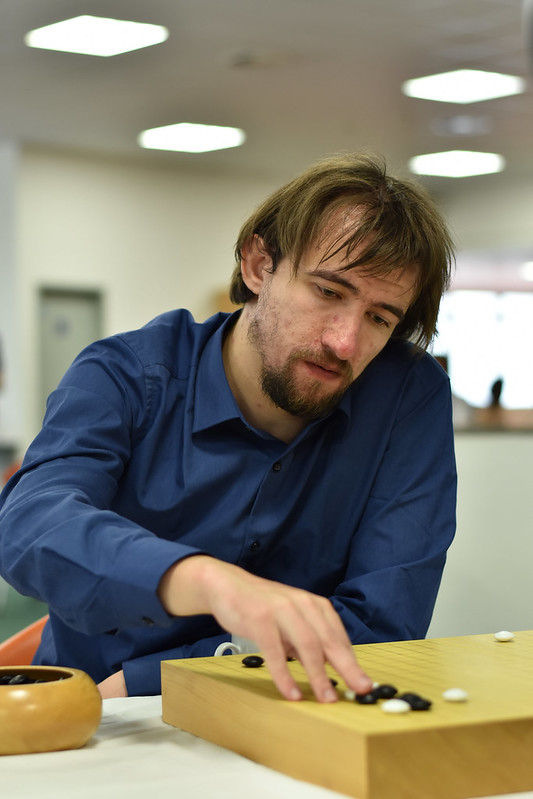
Artem: What are your recommendations for those who strive to improve in go?
Andrii: I think the best way to improve is to play regularly, maybe one or two games per day, and the most important thing is to review them by yourself. AI will help you find the best moves and learn new joseki, but you should think by yourself about what the general problem is and how to fix it in the next game – or you’ll find some conclusion that will help you next time.
Artem: Thank you, Andrii! I wish you all the success in your career as a professional player and see you at the next go tournaments!






